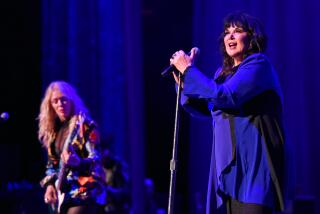This Sister Is Really Coming Into Her Own
- Share via
CARLSBAD — Never again should Venus and Serena be lumped into a single “Williams sisters” entity.
It is demeaning and insulting. It is meaningless, this talk of the “Williams sisters.” How many Grand Slams will the “Williams sisters” win? When will the “Williams sisters” be ranked Nos. 1 and 2? Did you hear what the “Williams sisters” said? As if Venus and Serena spoke out of the same mouth, as if they carried the same head on their shoulders, as if they looked the same or played the same or talked the same.
Or won the same.
Venus Williams, who dispatched 33-year-old Nathalie Tauziat, 6-2, 6-2, Friday in the quarterfinals of the Acura Classic at La Costa, is the winner of three Grand Slams. She has won the last two Wimbledons and is the defending U.S. Open champion. She plays a vibrant, confident game, both powerful and increasingly clever.
On Thursday night, Williams won a crucial break point on her serve by slamming a mean swing volley, then sneaking close to the net and ending the point against promising 18-year-old Daja Bedanova with a sweet, soft, backhand drop volley.
It has always been a knock on the “Williams sisters” that they had no finesse or feel for the game, no knowledge of how to end points in any way other than with their pummeling power.
But Venus is learning more about the game. She understands better the angles and percentages. She will choose more often to make sure her return of a second serve lands in the court instead of in the stands by easing up on the power switch.
More than her game has changed since Venus turned pro seven years ago. Her style of play was rough, her manner wary. Her brimming confidence was unseemly, and even then, when Serena hadn’t yet turned 13, the talk was already of the “Williams sisters.”
This was partly the fault of Richard Williams, the father and the coach. Richard was boldly predicting the glorious accomplishments of his daughters. He would stand in front of Venus and say that, absolutely, Serena would be better.
Right then we all should have paused and realized that paying attention to Richard was often silly and quoting him even sillier.
Because seven years later it is Venus who seems equipped with the physical tools and inner fortitude that could make her the game’s best player ever.
The Venus Williams who walked confidently onto the court here was a tall, striking woman wearing a dazzling lime-green, T-backed tennis dress and earrings in the shape of a lime. “An impulse buy,” she says, laughing.
This Venus is comfortable enough to show some of her personality. She talks about books and then about the massage she wants to have at this spa resort. She will deflect any questions about her father--those are mostly negative--in a way that is neither rude nor disrespectful of the man who, whatever faults he has, raised a bright, talented 21-year-old.
And this Venus is learning every day how to combine her incredible, graceful running ability and her supreme power into a total package.
Serena, 19, may have won the first family Grand Slam, but Venus has become a consummate pro. Serena is struggling with her inner resolve. Venus understands it is difficult right now for Serena. “She’s hurt so much and her confidence is missing,” Venus says. Venus has won this battle already, though.
The sisters love each other. They are friends. They are practice partners, doubles partners. So Venus fumbles to answer a question about whether she is bothered to so often be a sister and not Venus. Finally Venus says, “I think someday people will know who Venus is and who Serena is.”
They are not twins. They are not joined at the hip.
It was silly to debate for months what it meant when Venus, an unhappy and distraught semifinal loser to Martina Hingis, sat in the U.S. Open player box with a hood pulled over her pouting face as Serena beat Hingis to win that 1999 Open.
What did it mean? It meant Venus had taken her semifinal loss hard. It meant Venus had very much wanted to win her first Grand Slam title. It meant maybe Venus was a little jealous of her younger sibling. It happens to all of us. It’s a pretty saintly sort who hasn’t at some point resented a sibling’s success.
And when Serena, an unhappy quarterfinal loser to Jennifer Capriati, wasn’t in the box to cheer for Venus as she won her second straight Wimbledon title this summer, why did anyone care?
There was no need to wonder if the sisters were fighting or angry with each other. Serena wanted to win Wimbledon, same as Capriati, Hingis, Lindsay Davenport and a load of other players. None stuck around to watch the final, either.
There is no need to have Venus and Serena together always. There is no need to rush to Richard anymore, either, hoping that the father will blurt out controversial statements. When Richard says Venus is going to retire, ignore it. When Venus says Venus is going to retire, that’s important.
And let’s hope it doesn’t happen for a very long time.
Because each season Venus is becoming a better tennis player and letting us get to know a more interesting person. Venus shouldn’t be compared to Serena. Maybe Venus should be compared to history’s tennis greats.
If Venus stays healthy and interested in the game, she can make a very big mark in its history. She won’t be doing it as a “Williams sister,” either.
She will be doing it as uniquely Venus.
*
Diane Pucin can be reached at diane.pucin@latimes.com
More to Read
Go beyond the scoreboard
Get the latest on L.A.'s teams in the daily Sports Report newsletter.
You may occasionally receive promotional content from the Los Angeles Times.










